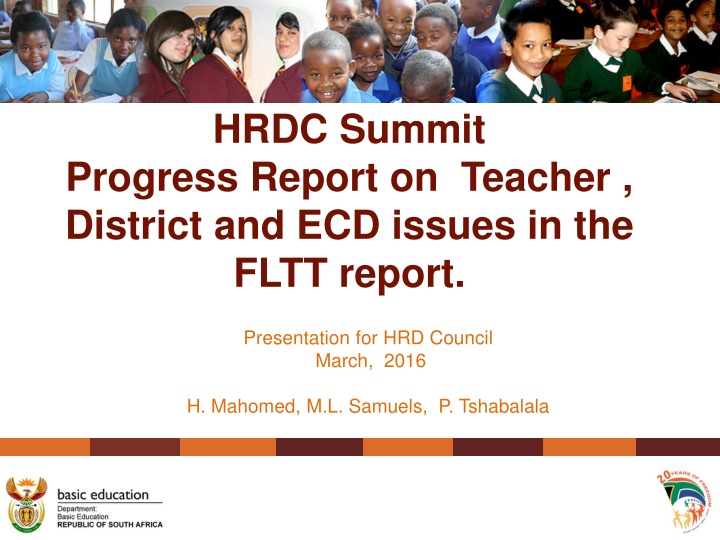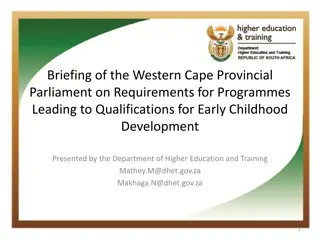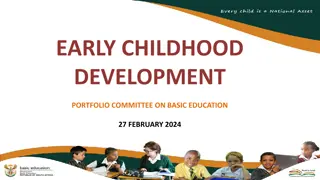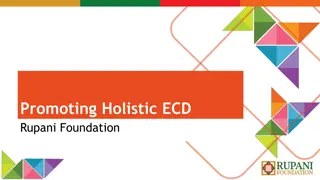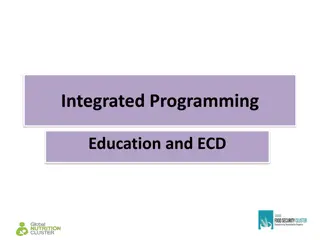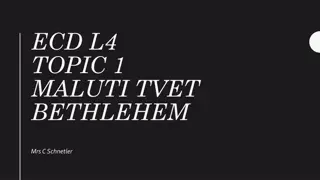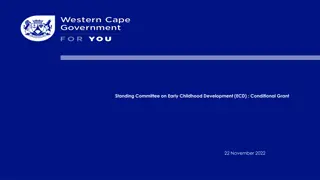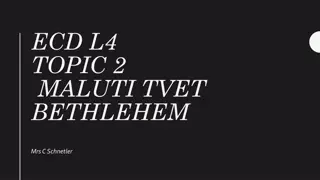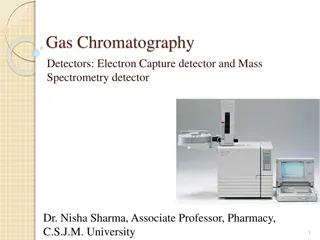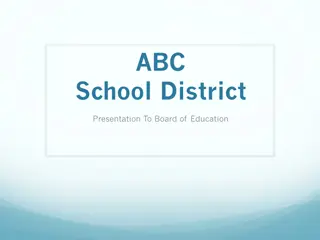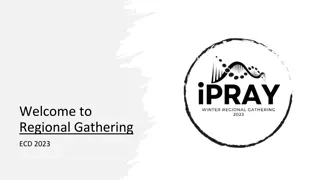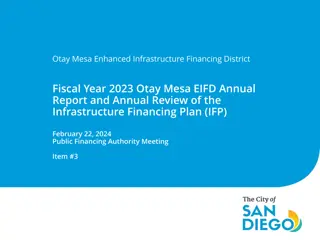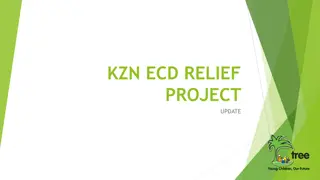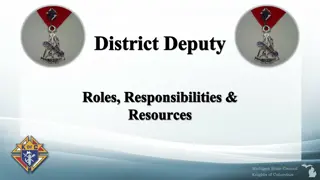HRDC Summit Progress Report on Teacher, District, and ECD Issues
The FLTT report covers areas such as teacher professionalism, districts, and ECD. The presentation responds to recommendations made by the FLLT Task Report, indicating progress and recommending further actions for the sector and HRD. Progress on teacher professionalism policies, implementation, and development is discussed, along with recommendations for policy development and capacity building in the education sector.
Download Presentation

Please find below an Image/Link to download the presentation.
The content on the website is provided AS IS for your information and personal use only. It may not be sold, licensed, or shared on other websites without obtaining consent from the author.If you encounter any issues during the download, it is possible that the publisher has removed the file from their server.
You are allowed to download the files provided on this website for personal or commercial use, subject to the condition that they are used lawfully. All files are the property of their respective owners.
The content on the website is provided AS IS for your information and personal use only. It may not be sold, licensed, or shared on other websites without obtaining consent from the author.
E N D
Presentation Transcript
HRDC Summit Progress Report on Teacher , District and ECD issues in the FLTT report. Presentation for HRD Council March, 2016 H. Mahomed, M.L. Samuels, P. Tshabalala
Overview The FLTT report (2014) covers the ff areas : 1. Teacher professionalism and professionalisation ( The teaching profession, Induction, Professional Standards, CPD, Advocacy). 2. Districts 3. ECD The presentation responds to the recommendations made by the FLLT Task Report. It indicates progress and recommends further actions for the sector and HRD.
FLTT RECOMMENDATION Progress Needs/recommendations Policy development and implementati on: TEACHER PROFESSION ALISM Mini stry Focus on implement ation and monitoring of existing policy framework s. The ISPFTED is taken as the basis for implementation . More capacity has been brought into DBE ; Support and monitoring processes to PEDs have been strengthened through NSLA and 3 year planning and discussions with AG office. Partnerships formed with SETA; VODACOM, UNICEF, UNISA, MICROSOFT; INTEL. Detailed SMART plans have been developed. Partnerships in specific areas to be supported: gateway subjects, arts and culture , Sports; PEDs to strengthen NSLA planning reporting and monitoring. 2. Review the SACE Act/ its roles, responsibil ities, capacity. SACE has added the activity of professionalisation of teaching as a professions and the development of professional standards to its Medium term plans. Meet with SACE Council and Portfolio Committee to assess further areas of support. DBE and unions in the ELRC 3. Finalise implementat ion of Collective Agreement number 1 of 2008: Negotiations on outstanding matters in the ELRC Collective Agreement No. 1 of 2008 has commenced. The Task Team responsible for the Education Management Service (EMS) for office- based educators was revived for this purpose. The ELRC appointed a service provider to evaluate the job profiles of circuit managers. HRD Council to track progress and advise
Needs/recomme ndations FLTT RECOMMENDATION Progress Gazetting of the revised Personnel Administrat ive Measures (PAM) The process of developin g professio nal standards involving all stakehold ers should be finalised. Policy developmen t and implementa tion: TEACHING PROFESSIO N DBE Negotiations on the review of the Personnel Administrative Measures (PAM) have been concluded at the ELRC. The revised PAM has been published for comment. HRD to track progress and advise The Department participated in the validation process of the Commonwealth Professional Standards for Teachers and School Heads. This process is driven by SAQA and facilitated by JET Education Services. The DHET and SACE is participating in the validation process. SACE has produced a draft Teacher Professionalization research report that is due for consultation and discussion. A National Advisrory Group has been established to inform the process. Professional Standards for teachers All Stakehold ers. DBE DHET SACE Business Units SAQA Unions HRD to track progress and advise
Needs/recom mendations FLTT RECOMMENDATION Progress A New Teachers Orientation Booklet is being finalised. as 1ststep towards a National Induction Programme. Research on Induction is being done by the CDE and funded by ZENEX. The preliminary research findings were presented and discussed. The DBE collaborated with DHET, SACE and the Centre for Development and Enterprise to host a colloquium on professionalising teacher education. Framework for teacher induction programmes, required. Teacher professional ism: INDUCTION DBE, DHET and SACE HRD to track progress and advise Develop and implement a strategy for the development of mentors to support the implementation of induction for teachers. The development of a strategy for the development of mentors. The Directorate is collaborating with the Primary School Science Project (PSP) on the Induction and Mentoring of new teachers. A funding proposal for the collaboration with a work breakdown, activities, timeframes and budget has been developed. The project is planned for implementation from 2016 to 2018. research mentioned above will inform the HRD to track progress and advise Teacher Education Institutions Develop programmes for the development of mentors as components for inclusion in the relevant qualifications identified in the MRTEQ. The University of Johannesburg (UJ) is developing a self- contained training course for mentor teachers. The idea is that it will be a course that will be made freely available to other universities and the DBE. The program will be funded by the DHET.
FLTT Needs/recommendation s Progress RECOMMENDATION Quality of programmes rolled out through the SACE CPTD Management System CONTINUOUS PROFESSIONAL DEVELOPMENT DBE & SACE HRD to track progress and advise 1. A DBE-SACE endorsement committee is in operation to oversee the endorsements awarded by the evaluators. A monitoring system is in place Over 500 courses have been endorsed by SACE 2. 3. Promote and launch a national campaign advocating that teaching is a learning career. ( internal and societal focus). Teaching as a career All stakehol ders and roleplaye rs HRD to consider mobilising support from private and other sectors to support the programme. The DBE has facilitated the establishment of a Teacher Support and Appreciation Programme (TASP), led by SACE and involving all key players ( ELRC, SETA, SGBs, unions.). The programme aims to highlight the value of teaching and the profession. The Department is implementing the Funza Lushaka bursary programme. The programme aims to attract young people to the teaching profession. Approximately 14,000 bursaries will be made available during 2016/17. Through the Community Based Teacher Recruitment campaign there is a specific focus on recruiting teachers from local communities.
FLTT RECOMMENDATION DBE should use the finalised District staffing norms to develop a costing of implementation of the Policy on the Organisation, Roles and Responsibilities of Education Districts (2013). A transitional plan for gradual access to full implementation of the norms should be devised implemented and rigorously monitored, in alignment with the DBE Action Plan to 2025. The Department of Basic Education should develop and implement a strategy for funding and equipping districts with requisite material resources, prioritising transport and communications. The strategy should include long term and progressive time frames that specify alignment with the appointment of human resource capacity, so that as suitable staff are appointed, the material resources are made available for them to fulfil their responsibilities The transition model should be properly trialled before a universal rollout. Funds allocated to PEDs for these purposes should be ring fenced accordingly. Progress Needs/recommendations DBE 1. Districts Districts 2. 3. 4.
FLTT RECOMMENDATION 5. The Provincial Education Departments should proceed immediately to implement those aspects of the Districts Policy that have no budgetary implications Progress Needs/recommendations Districts Districts Districts 6. The extent of capacity development in regard to staffing of Subject Advisory services in key subjects and phases should be carefully estimated and prioritised for implementation. 7. The Provincial Education Departments should establish a central subject advisory and school support team pool that can be used flexibly in different districts as needed as an interim measure. 8. Business partners should leverage funding from business for the establishment of the PED pools of Subject Advisory and school support expertise
Needs/recommendati ons FLTT RECOMMENDATION Progress DBE, DHET and SACE should develop and implement a strategy for prioritising the development of Subject Advisor capacity, including timeframes and funding considerations. Teacher Education Institutions should develop and deliver programmes for the development of Subject Advisors, as components to be included in the relevant qualifications identified in the MRTEQ District culture change DBE should require PEDs to prioritise delivery of change management programmes in the districts in terms of a shift from compliance to support in district culture. Distri cts- subje ct Advis ors There are existing strategies as indicated in the ISPFTED - Districts Districts HRD Council can play a role in monitoring progress and strengthening delivery arms at provincial level.
Needs/recommendation s FLTT RECOMMENDATION Progress 1.3 District culture change DBE should require PEDs to prioritise delivery of change management programmes in the districts in terms of a shift from compliance to support in district culture. Districts- subject Advisors Disticts Districts 1.4 School culture change Research institutes should investigate and pilot projects aimed at developing and supporting collaborative reflective practice among teachers within schools, including identifying features of contexts into which these projects may profitably be introduced.
Needs/recommendatio ns FLTT RECOMMENDATION Progress 1. The establishment of intersectoral management, coordination and monitoring of ECD should be supported and strengthened. DBE ECD 2. The DBE in collaboration with the Department of Social Development should support the finalisation and implementation of the national ECD policy and programme and assist in its implementation .
Needs/recommendati ons FLTT RECOMMENDATION Progress 3. The DBE should incorporate Grade R staff onto school staff establishments with appropriate conditions of service in accordance with their qualifications and experience. ECD 4. The DBE should prioritise the development of under qualified Grade R teachers. 5. Districts should coordinate and manage the ECD initiatives that are implemented within their jurisdiction.
Conclusion It is proposed that the HRD Council should consider the report and advise and assess where support can be provided.
